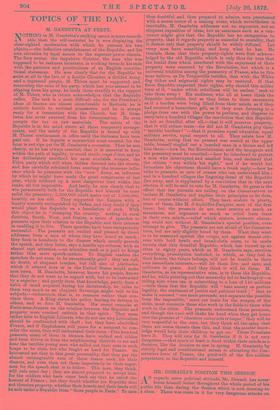TOPICS OF THE DAY.
M. GAMBETTA AT FERTE.
thus doubtful and thus prepared to admire, men penetrated with a secret terror of a coming event, which nevertheless in inevitable, M. Gambetta addresses not an argument, not an. eloquent exposition of ideas, but an assurance such as a con- queror might give that the Republic has no antagonism to. property, that it regards property as essential to morality, that it desires only that property should be widely diffused. Let every man have something, and keep what he has. He. reminds them that their property-rights were first acknow- ledged by the old Republic, which is only thus far true that the feudal dues which interfered with the enjoyment of their. property were removed by the Revolution, but which is a universal tradition among the peasantry of France, who to this hour believe, as De Tocqueville testifies, that with the White. flag tithes and seignorial rights may be restored. If that fierce Republic respected their rights, why should this milder form of it, "under which rebellions will be useless," seek to take them away? His audience, who all at heart think the. Republic inevitable, feel as they listen to these assurances. as if a burden were being lifted from their minds, as if they had received a benevolent gift, as if they were listening to a. pledge from one with the power to perform, and disperse to. carry into a hundred villages the conviction that this Republic. is not so dreadful after all,—that it will preserve property, that it will reduce taxes—for did not M. Gambetta pity their "terrible burdens ? "—that it promises equal education, equal. military service, equal respect to all. They relate how M.. Gambetta, seeing that no peasant was seated at the upper table, himself singled out a bearded man in a blouse and led: him there,—how he, the Revolutionist, said the bourgeois and the peasantry must be reunited,—how he interfered to protect. a man who interrupted and assailed him, and declared that the citizen "was within his right," and if he would but formulate his objections should have a frank reply,—how her talks to peasants as men of reason who can understand him;. and in a hundred villages the lingering dread of the Republic dies away, and is supplanted by a conviction that in the next election it will be well to vote for M. Gambetta. So great is the- effect that the journals are calling on the Conservatives to imitate M. Gambetta and explain their principles as he does,. but of course without effect. They have orators in plenty, some of them, like M. d'Audriffet-Pasquier, men of the first force; but the peasants do not want oratory so much as assurances, not argument so much as relief from fears in their own minds,—relief which orators, however charm- ing, could not, without M. Gambetta's special position, even. attempt to give. The peasants are not afraid of the Conserva- tives, but are only slightly bored by them. What they want. is to be reassured against the rouges, not against decent citi- zens with bald heads and broad-cloth coats, to be made certain that this dreadful Republic. which has turned up so- often in eighty years, which as M. Gambetta says, survives everything, proscription included, to which, as they feel in their hearts, the future belongs, will not be hostile to their own immediate interests,—will let them live, and save, and. cultivate in peace. And they think it will let them. M. Gambetta, as its representative man, is to them the Republic,. and he, while pointing out that monarchy led to bankruptcy—a telling hint when one is subscribing to a loan of 140 millions —tells them that the Republic will "base society on perfect legality, the sentiment of justice and political truth ; " that to make it succeed "one must persuade, and separate the possible. from the impossible," must use brain for the weapon of the- strife, must reconcile those who work in the fields to those who work in the cities. The peasants understand those promises, and though the cure will shake his head when they get home- over the promise of "education universelle et laigue," they will be- very respectful to the cure, but they think all the same that- there are worse threats than this, and that the seoular know-- ledge would help their children to get on. Those Prussians haveit. They will vote for M. Gambetta if it is not very dangerous,—that much at least is fixed within their minds as a. decision, like the decision to sow in spring. M. Gambetta by strictly legal and constitutional means is attracting the Con- servative force of France, the good-will of the five million. proprietors, to the Republic and himself.


































 Previous page
Previous page